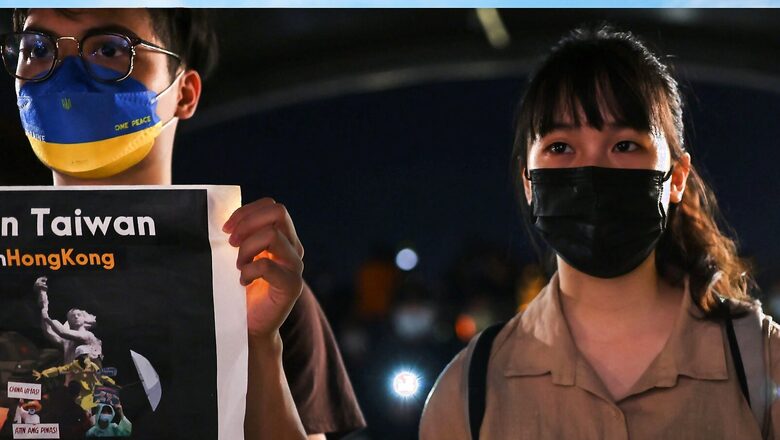
views
In the 2022 Shangri-La Dialogue, Wei Fenghe, China’s Defence Minister, declared , “If anyone dares to secede Taiwan from China, we will not hesitate to fight, We will fight at all costs. And we will fight to the very end. This is the only choice for China.” This was not an affirmation of China’s claim over Taiwan, it was rather a threat to Taiwan and countries voicing support for Taiwan. Wei called Taiwan “first and foremost China’s Taiwan”. This is far from the truth. Taiwan is not China’s to claim and is different from China in a variety of areas. In fact, in response to Wei Fenghe, Joanne Wu, Taiwan’s Ministry of Foreign Affairs spokesperson, stated, “Taiwan has never been under the jurisdiction of the Chinese government, and the people of Taiwan will not succumb to threats of force from the Chinese government.”
With the Democratic Progressive Party (DPP) coming to power in 2016, Taiwan’s President Tsai Ing-wen refused to accept the 1992 consensus and began to emphasise on the will of the Taiwanese people for deciding the fate of the country. Consequently, the Chinese Communist Party (CCP) government suspended the cross-Strait dialogue.
To change facts on the ground, China has been using military as well as economic coercion against Taiwan. While encroachment into Taiwan’s Air Defence Identification Zone (ADIZ) is a regular exercise for China now, in a recent move to economically coerce Taiwan, China banned the import of grouper fish from Taiwan. Earlier, it banned Taiwanese pineapples, wax and sugar apples, and frozen custard apples.
Taiwan is not China
Taiwan is emerging as the biggest flashpoint in the Indo-Pacific region. China’s aggression against Taiwan and latter’s resistance against it have acquired salience in the recent past, and with that the contrast in the two countries is visible than ever before. Two countries across the Taiwan Strait exhibit stark differences — one is demonstrating bullying tendencies and showing aggression, and the other is fighting for its existence and safety of its 24 million people; one is an authoritarian state, the other is a near-perfect democracy; one handled the Covid-19 pandemic while keeping the interests of the Chinese Communist Party (CCP) in consideration, the other handled the pandemic with a people-centric approach; one that expelled foreign correspondents, the other welcomed foreign correspondents when China’s door was closed for them.
Even the way two countries practice diplomacy is noteworthy. Taiwan uses its cat warrior diplomacy to safeguard its interests and promote its values, whereas Chinese diplomats regularly use the wolf warrior diplomacy on social media platforms to attack liberal democracies that are not in sync with the CCP government’s ideology.
In the past five years, Taiwan has undergone tremendous changes. Some of the changes, at least in the outlook of the Taiwanese people, have come about after China’s breaching of the Hong Kong handover treaty and the subsequent treatment of the Hong Kongers. There is a greater realisation that one country, two systems is not workable for Taiwan and its people.
Taiwanese identity, too, has undergone major shifts. According to a survey conducted by the Election Study Center, National Chengchi University, the number of people identifying themselves as Taiwanese has increased from 17.6% in 1992 to 62.3% in 2021, whereas those identifying themselves as Chinese has decreased from 25.5% in 1992 to 2.8% in 2021.
Support for Taiwan is a Necessity
There are plenty of reasons for countries to support Taiwan and raise the voice against China’s aggression. Beijing is attempting to ratchet up tensions vis-à-vis Taipei, but after Russia’s invasion of Ukraine, it has become more relevant than ever that due attention is paid to Taiwan’s security. Taiwan under China’s control is not in the interests of the international community including India. The status quo in the cross-Strait relations is the best-case scenario for the international community. To persuade China to revert to the status quo, a coalition of efforts is a must.
Additionally, Taiwan is much more than the cross-Strait tension. Most of the time, discussions on Taiwan is confined to the not so imminent Chinese invasion of Taiwan. This message gets lost while discussing Taiwan in the mainstream debates. The differences between Taiwan and China should be highlighted by the strategic community and media outlets of like-minded countries. While this does not warrant a long-term policy change in the Indo-Pacific countries, it would be enough to give Taiwan its due.
Sana Hashmi is Visiting Fellow at Taiwan-Asia Exchange Foundation. The views expressed in this article are those of the author and do not represent the stand of this publication.
Read all the Latest News , Breaking News , watch Top Videos and Live TV here.



















Comments
0 comment